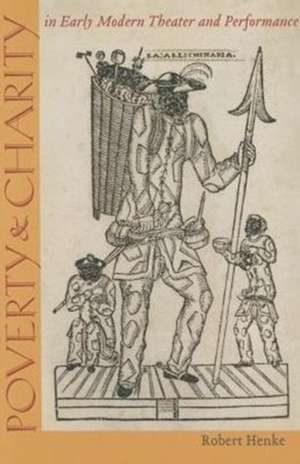Poverty and Charity in Early Modern Theater and Performance: Studies Theatre Hist & Culture
Autor Robert Henkeen Limba Engleză Paperback – 31 iul 2015
Whereas previous studies of poverty and early modern theatre have concentrated on England and the criminal rogue, Poverty and Charity in Early Modern Theatre and Performance takes a transnational approach, which reveals a greater range of attitudes and charitable practices regarding the poor than state poor laws and rogue books suggest. Close study of German and Latin beggar catalogues, popular songs performed in Italian piazzas, the Paduan actor-playwright Ruzante, the commedia dell’arte in both Italy and France, and Shakespeare demonstrate how early modern theatre and performance could reveal the gap between official policy and actual practices regarding the poor.
The actor-based theatre and performance traditions examined in this study, which persistently explore felt connections between the itinerant actor and the vagabond beggar, evoke the poor through complex and variegated forms of imagination, thought, and feeling. Early modern theatre does not simply reflect the social ills of hunger, poverty, and degradation, but works them through the forms of poverty, involving displacement, condensation, exaggeration, projection, fictionalization, and marginalization. As the critical mass of medieval charity was put into question, the beggar-almsgiver encounter became more like a performance. But it was not a performance whose script was prewritten as the inevitable exposure of the dissembling beggar. Just as people’s attitudes toward the poor could rapidly change from skepticism to sympathy during famines and times of acute need, fictions of performance such as Edgar’s dazzling impersonation of a mad beggar in Shakespeare’s King Lear could prompt responses of sympathy and even radical calls for economic redistribution.
The actor-based theatre and performance traditions examined in this study, which persistently explore felt connections between the itinerant actor and the vagabond beggar, evoke the poor through complex and variegated forms of imagination, thought, and feeling. Early modern theatre does not simply reflect the social ills of hunger, poverty, and degradation, but works them through the forms of poverty, involving displacement, condensation, exaggeration, projection, fictionalization, and marginalization. As the critical mass of medieval charity was put into question, the beggar-almsgiver encounter became more like a performance. But it was not a performance whose script was prewritten as the inevitable exposure of the dissembling beggar. Just as people’s attitudes toward the poor could rapidly change from skepticism to sympathy during famines and times of acute need, fictions of performance such as Edgar’s dazzling impersonation of a mad beggar in Shakespeare’s King Lear could prompt responses of sympathy and even radical calls for economic redistribution.
Din seria Studies Theatre Hist & Culture
-
 Preț: 374.71 lei
Preț: 374.71 lei - 15%
 Preț: 536.91 lei
Preț: 536.91 lei -
 Preț: 275.52 lei
Preț: 275.52 lei -
 Preț: 173.28 lei
Preț: 173.28 lei -
 Preț: 238.08 lei
Preț: 238.08 lei -
 Preț: 215.94 lei
Preț: 215.94 lei - 8%
 Preț: 353.55 lei
Preț: 353.55 lei - 7%
 Preț: 348.81 lei
Preț: 348.81 lei -
 Preț: 296.31 lei
Preț: 296.31 lei -
 Preț: 128.37 lei
Preț: 128.37 lei -
 Preț: 259.44 lei
Preț: 259.44 lei -
 Preț: 307.58 lei
Preț: 307.58 lei -
 Preț: 338.61 lei
Preț: 338.61 lei - 9%
 Preț: 408.78 lei
Preț: 408.78 lei - 7%
 Preț: 377.38 lei
Preț: 377.38 lei - 15%
 Preț: 563.68 lei
Preț: 563.68 lei - 15%
 Preț: 563.44 lei
Preț: 563.44 lei - 15%
 Preț: 440.42 lei
Preț: 440.42 lei - 15%
 Preț: 557.08 lei
Preț: 557.08 lei -
 Preț: 193.58 lei
Preț: 193.58 lei - 15%
 Preț: 534.61 lei
Preț: 534.61 lei
Preț: 379.02 lei
Preț vechi: 408.59 lei
-7% Nou
Puncte Express: 569
Preț estimativ în valută:
72.53€ • 78.76$ • 60.93£
72.53€ • 78.76$ • 60.93£
Carte indisponibilă temporar
Doresc să fiu notificat când acest titlu va fi disponibil:
Se trimite...
Preluare comenzi: 021 569.72.76
Specificații
ISBN-13: 9781609383619
ISBN-10: 1609383613
Pagini: 224
Ilustrații: 11 b&w illustrations
Dimensiuni: 152 x 229 x 18 mm
Greutate: 0.5 kg
Ediția:1
Editura: University of Iowa Press
Colecția University Of Iowa Press
Seria Studies Theatre Hist & Culture
ISBN-10: 1609383613
Pagini: 224
Ilustrații: 11 b&w illustrations
Dimensiuni: 152 x 229 x 18 mm
Greutate: 0.5 kg
Ediția:1
Editura: University of Iowa Press
Colecția University Of Iowa Press
Seria Studies Theatre Hist & Culture
Recenzii
“The argument about poverty and hunger is completely convincing, and the breadth of knowledge across languages, cultures, and theatrical conditions is breathtaking.”—Cary M. Mazer, University of Pennsylvania
“Robert Henke’s transnational, interdisciplinary study offers a perceptive and illuminating counterpoint between texts and contexts, hunger and gluttony, the England of Shakespeare and the Italy of Ruzante, between a literary approach and a historical one, and above all between actors as beggars, soliciting donations, and beggars as actors, performing their poverty.”—Peter Burke, author, Popular Culture in Early Modern Europe
Notă biografică
Robert Henke is professor of drama and comparative literature at Washington University in St. Louis. He is the author of Pastoral Transformations: Italian Tragicomedy and Shakespeare’s Late Plays and Performance and Literature in the Commedia dell’Arte. He coedited Transnational Exchange in Early Modern Theater and Transnational Mobilities in Early Modern Theater. Codirector of the Prison Education Project at Missouri Eastern Correctional Center and Washington University, he lives in St. Louis, Missouri.
Descriere
Whereas previous studies of poverty and early modern theatre have concentrated on England and the criminal rogue, Poverty and Charity in Early Modern Theatre and Performance takes a transnational approach, which reveals a greater range of attitudes and charitable practices regarding the poor than state poor laws and rogue books suggest. Close study of German and Latin beggar catalogues, popular songs performed in Italian piazzas, the Paduan actor-playwright Ruzante, the commedia dell’arte in both Italy and France, and Shakespeare demonstrate how early modern theatre and performance could reveal the gap between official policy and actual practices regarding the poor.
